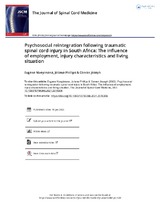Psychosocial reintegration following traumatic spinal cord injury in South Africa: The influence of employment, injury characteristics and living situation
Abstract
1Department of Health and Rehabilitation Sciences, Division of Physiotherapy, Stellenbosch University, Cape
Town, South Africa, 2Department of Physiotherapy, University of the Western Cape, Cape Town, South Africa
Objectives: To determine the influence of employment, injury characteristics and living situation on
psychosocial reintegration in individuals who sustained a traumatic spinal cord injury (TSCI) in South Africa.
Design: A cross-sectional exploratory survey.
Settings: Communities of the Cape Metropolitan Area, South Africa.
Participants: A total of 108 community- dwelling adults, between ages of 19 and 71 years, who have sustained a
TSCI more than 1- year ago.
Outcome measures: : The Sydney psychosocial reintegration scale (SPRS-2).
Results: The SPRS-2 and domains mean (SD) scores were: (1) Overall SPRS-2 of 27.87(13.4); (2) Occupational
activity of 8.62 (4.8); (3) Interpersonal relationships of 9.80 (5.1); and (4) Living skills of 9.45 (4.9). Multivariate
regression analysis resulted in two significant independent variables, namely employment and living situation.
Employment alone explained 24.3% of the variance in the overall psychosocial model, 25.6% in the
occupational activity model, while employment together with living situation explained 24.2% of the variance
in the living skills model, with those employed reporting better psychosocial reintegration and those living in
informal dwellings reporting poorer psychosocial reintegration.
Conclusion: Employment and living situation strongly influenced psychosocial reintegration following a TSCI,
indicating the important role of socio-economic status for psychosocial adaptation after injury. As
employment plays a significant mediating role, and living in informal dwellings negatively affect
psychosocial reintegration following a TSCI, rehabilitation stakeholders and policy makers need to continue
lobbying for social and political change that support employment opportunities and provide accessible
housing for persons with TSCI.

